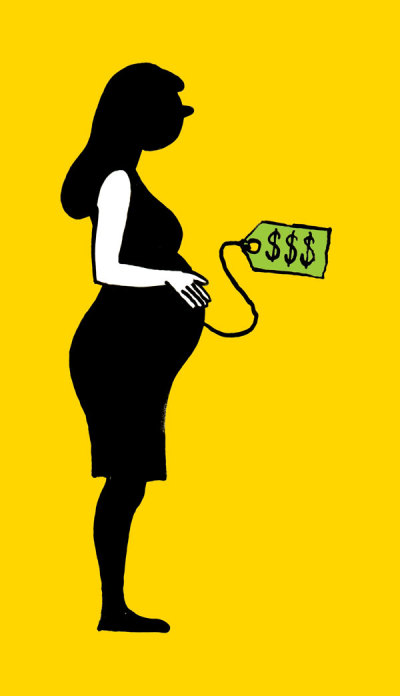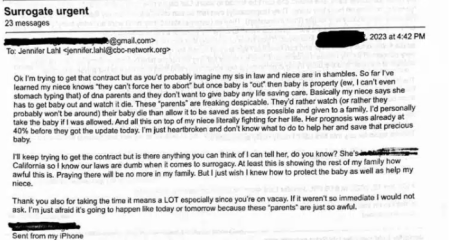When surrogacy goes badly: Purchasing parents vs. pregnant woman

Recently I had a young woman reach out to me on Facebook via direct message. Her message began with, “I have a super urgent question.” I knew immediately it was either an egg "donation" or surrogacy gone bad problem.
The woman went on to describe a current situation in her family involving her niece, a young married mother with four young children, doing her second surrogacy. During her first surrogacy, she delivered twins, and since it was without any noticeable problems, she decided to do another surrogacy. Her aunt communicated to me that her niece is very kind, caring, and loves to help people.
However, this surrogate pregnancy had taken a dramatic turn for the worse because, during her second trimester, she was diagnosed with aggressive metastatic breast cancer. The problem facing her niece, she explained, was if she consented to treatment directed at her cancer, she would be required to terminate the pregnancy because the cancer therapy would be harmful to the developing 24-week fetus. Unwilling to abort the baby, the surrogate mother and her family were left trying to find a hospital where she would be allowed to deliver the baby early, in order to allow her to begin her cancer treatment. They knew that at this stage in the pregnancy, the baby might not survive but that with support from the hospital staff, the baby could possibly survive.
This surrogate was faced with a decision most pregnant women hope they never have to face — saving one life at the risk of losing another. To make matters worse, the two intended fathers wanted her to abort the baby because they didn’t want a baby who would be born prematurely, and who may have serious medical needs. The fathers refused to entertain the idea of allowing the baby, if delivered alive, to be adopted by the surrogate or someone else. The fathers stated they didn’t want their “DNA out there” being raised by someone else. Even one of the surrogate’s doctors said they knew someone willing to adopt the baby, but the fathers just wanted a “death certificate” for the child and asked that no life-saving measures be performed on the baby if he was born alive.
It is unclear why the fathers requested a death certificate, but maybe it was to render the surrogacy contract null and void since the pregnancy didn’t end with them receiving the baby. Surrogates are often paid their compensation throughout the duration of the pregnancy, with the final payment made at the surrendering of the child and relinquishing their maternal rights if applicable by state law.

In the next few days that followed from when this woman made initial contact with me, this family found a lawyer who was of no use. They reached out to Child Protective Services (CPS) and were told that with a request for this type of immediate intervention law enforcement would have to intervene. They contacted their local Sheriff’s department who were sympathetic but said this was up to the hospital and they knew of no law that would allow them to intervene. In their desperation to get help for this otherwise healthy fetus, they were sad that CPS didn’t see this as infanticide if the baby was born alive but no one tried to support this premature infant.
Eventually, this surrogate mother was able to find a hospital that would induce labor and deliver that baby vaginally. The baby was born in the early hours of the morning and died soon after.
I often say, there are plenty of reasons to get people to see how surrogacy is wrong, harmful, and bad for women and for children. This case highlights many of the problems with contracted, largely commercial, pregnancy.
The physician in this case has two patients. First is the pregnant woman, and second is the baby she is carrying. We see competing interests in medical care between the mother and the baby being directed by the purchasing parents and not the physician. The mother wanted to try and deliver early, in hopes of saving the baby and being allowed to start her cancer treatment in hopes of saving her life. But California law recognizes the contracting intended parents in surrogacy arrangements as the legal parents, they alone can make decisions around the care of the baby. In this case, refusing care.
The rights of the mother to direct her own care are undermined, not even allowing her to advocate for her own needs and the needs of the baby she’s about to deliver.
These real stories are never splashed on the cover of magazines or make headline news. They don’t support the narrative of Big Fertility, which is to be an angel and help people build a family and get a cute healthy baby they so desperately want. These stories highlight there are real losers that pay a huge price, even if it is their own life.
Originally published at The Center for Bioethics and Culture Network.
Jennifer Lahl, MA, BSN, RN, is founder and president of The Center for Bioethics and Culture Network. Lahl couples her 25 years of experience as a pediatric critical care nurse, a hospital administrator, and a senior-level nursing manager with a deep passion to speak for those who have no voice. Lahl’s writings have appeared in various publications including Cambridge University Press, the San Francisco Chronicle, the Dallas Morning News, and the American Journal of Bioethics. As a field expert, she is routinely interviewed on radio and television including ABC, CBS, PBS, and NPR. She is also called upon to speak alongside lawmakers and members of the scientific community, even being invited to speak to members of the European Parliament in Brussels to address issues of egg trafficking; she has three times addressed the United Nations during the Commission on the Status of Women on egg and womb trafficking.





















